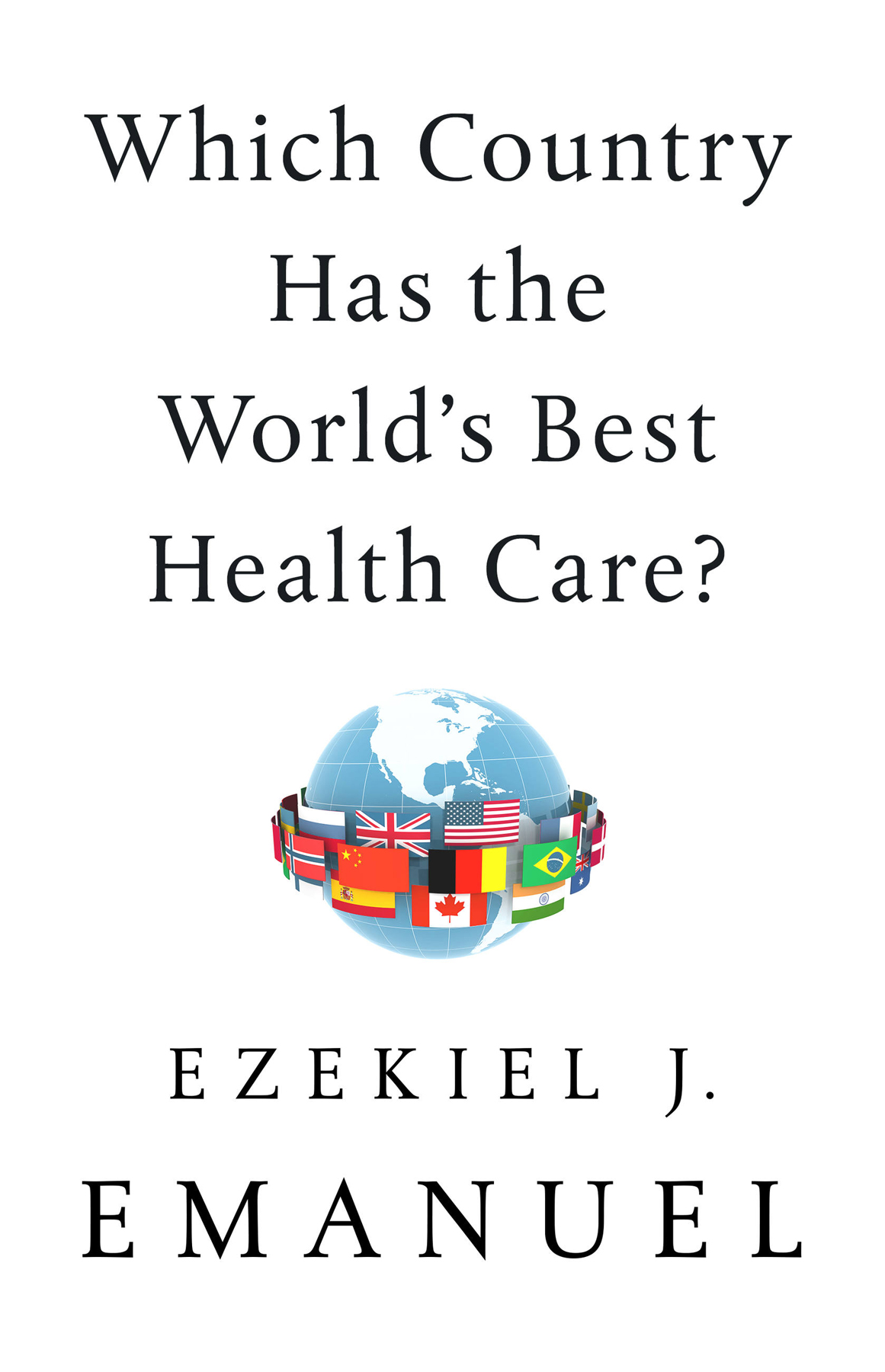Ezekiel J. Emanuel - Which country has the best health care in the world?
Here you can read online Ezekiel J. Emanuel - Which country has the best health care in the world? full text of the book (entire story) in english for free. Download pdf and epub, get meaning, cover and reviews about this ebook. year: 2020, publisher: PublicAffairs, genre: Politics. Description of the work, (preface) as well as reviews are available. Best literature library LitArk.com created for fans of good reading and offers a wide selection of genres:
Romance novel
Science fiction
Adventure
Detective
Science
History
Home and family
Prose
Art
Politics
Computer
Non-fiction
Religion
Business
Children
Humor
Choose a favorite category and find really read worthwhile books. Enjoy immersion in the world of imagination, feel the emotions of the characters or learn something new for yourself, make an fascinating discovery.

- Book:Which country has the best health care in the world?
- Author:
- Publisher:PublicAffairs
- Genre:
- Year:2020
- Rating:3 / 5
- Favourites:Add to favourites
- Your mark:
- 60
- 1
- 2
- 3
- 4
- 5
Which country has the best health care in the world?: summary, description and annotation
We offer to read an annotation, description, summary or preface (depends on what the author of the book "Which country has the best health care in the world?" wrote himself). If you haven't found the necessary information about the book — write in the comments, we will try to find it.
Which country has the best health care in the world? — read online for free the complete book (whole text) full work
Below is the text of the book, divided by pages. System saving the place of the last page read, allows you to conveniently read the book "Which country has the best health care in the world?" online for free, without having to search again every time where you left off. Put a bookmark, and you can go to the page where you finished reading at any time.
Font size:
Interval:
Bookmark:

Copyright 2020 by Ezekiel J. Emanuel
Cover design by Pete Garceau
Cover image iStock/Getty Images
Cover copyright 2020 Hachette Book Group, Inc.
Hachette Book Group supports the right to free expression and the value of copyright. The purpose of copyright is to encourage writers and artists to produce the creative works that enrich our culture.
The scanning, uploading, and distribution of this book without permission is a theft of the authors intellectual property. If you would like permission to use material from the book (other than for review purposes), please contact permissions@hbgusa.com. Thank you for your support of the authors rights.
PublicAffairs
Hachette Book Group
1290 Avenue of the Americas, New York, NY 10104
www.publicaffairsbooks.com
@Public_Affairs
First Edition: June 2020
Published by PublicAffairs, an imprint of Perseus Books, LLC, a subsidiary of Hachette Book Group, Inc. The PublicAffairs name and logo is a trademark of the Hachette Book Group.
The Hachette Speakers Bureau provides a wide range of authors for speaking events. To find out more, go to www.hachettespeakersbureau.com or call (866) 376-6591.
The publisher is not responsible for websites (or their content) that are not owned by the publisher.
Editorial production by Christine Marra, Marrathon Production Services, www.marrathoneditorial.org
Library of Congress Cataloging-in-Publication Data has been applied for.
ISBN 978-1-5417-9773-4 (hardcover), ISBN 978-1-5417-9772-7 (ebook)
E3-20200514-JV-NF-ORI
The Trillion Dollar Revolution (Edited with Abbe R. Gluck)
Prescription for the Future: The Twelve Transformational Practices of Highly Effective Medical Organizations
Reinventing American Health Care: How the Affordable Care Act Will Improve Our Terribly Complex, Blatantly Unjust, Outrageously Expensive, Grossly Inefficient, Error Prone System
Healthcare, Guaranteed
All the countries covered in this book have dynamic health care systems. They are frequentlyeven constantlymodifying their health care systems. Occasionally this is by a major piece of legislation, but more frequently it is by new regulations or other arrangements. Furthermore, many of the nongovernmental actors in a countrythe insurance companies, the physicians, the hospitals, and othersare taking action. For instance, insurance companies merge or cease functioning.
In addition, the countries studied in this book tabulate and report data in substantially different ways. For instance, official statistics regarding drug costs vary widely. In some cases, validated drug spending is reported only as retail pharmacy sales. In other cases, official drug spending statistics include drugs administered in hospitals. Other governments only report the cost of drugs the government subsidizes.
Finally, some of my sources disagreed about how some aspects of the health care system operate or should be described. For instance, there is disagreement about whether to consider long-term care financing as part of the health care budget. These differences are a function of both professional judgment and the particular history of each countrys health care system.
The consequence of these issues is that accuracy is a matter of direction and degree. I have done my best to report all facts using 2017 data and to make the data as comparable as possible, so that the overall picture conveyed is as close to reality as it can be. I apologize if I have missed any changes in these health care systems since the writing of this book. Nevertheless, the overall structures and tendencies I report are valid and, I hope, helpful to the reader.
TO TEASEL
A real Aristotelian who helps me embody the Aristotelian virtues
Which country has the worlds best health care system?
I get this question at almost every speech I give. Most of the time the question comes from someone who wants to know which country the United States should model itself after to create the worlds best system here at home. But sometimes I wonder whether Im really being asked a question about medical tourismwhether the questioner wants to know which country they should go to if they need to get some medical service, such as dental care, a hip replacement, or cataract surgery.
This is the type of question I usually love.
I rank everything. I rank the 10 best meals Ive ever had (#1 Alinea in Chicago, #2 Tanja Grandits in Basel, and #3 OCD in Tel-Aviv). I rank chocolates (#1 Askinosie, #2 Dick Taylor of California, and #3 Fruition of New York). I rank Alpine cheeses (#1 is a tie between Alpha Tolman and Alp Blossom). I rank colleges. I rank academic departments of bioethics and health policy that compete with my own. I rank the meals I cook, the races I run, the bike rides I take, the speeches I give.
I should love ranking health systems. But I dont. When asked, I answer, That is a terrible question. You cannot just take the worlds best system, whether it is the Dutch or Swiss or Norwegian or Australian one, and plunk it down in the United States and think we will get better health care. Health care is path dependent. We have built up numerous institutions over decades that constrain and limit our ability to change the system. And each country prioritizes different values that color which policy options they adopt. Some of these systems, like Norway, provide free insurance with no co-pays for children and people who need a lot of health care. Others, like the United States, emphasize making patients have more skin in the game. Some emphasize hospital-based care, others want more care in the home. Some, anticipating the aging of the population, have proactively instituted mandatory long-term care insurance. Others prioritize more comprehensive, free care for children. Still others are more passive, waiting for a crisis to stimulate policy changes.
Consider where the US system is now. About half of all Americans get their coverage through employer-sponsored insurance, with employers paying most of the premium as a pre-tax fringe benefit. (I use paying ironically because the money really comes from reduced worker wages. Although economists believe and can prove that, no one else seems to accept the idea.) The majority of other Americans are covered by 2 government-financed programs: Medicare and Medicaid. Nearly 5,000 private community hospitals and hundreds of thousands of privately employed physicians deliver care. Insurers organize these hospitals and physicians into preferred networks and adjust co-payments to encourage patients to stay in network. We have built up extensive networks of private home health care agencies and home hospices, commercial dialysis centers, ambulatory surgical centers, and skilled nursing facilities. Myriad governmental bodiesfrom state insurance commissioners and physician and nurse licensure boards to the federal Food and Drug Administration (FDA) and the Federal Trade Commissionregulate various components of the system. Private organizations, such as the Joint Commission and boards of medical and surgical specialties, help ensure quality of care. All these institutionsthe way they are paid, how they deliver care, and what they regulateshape how the system operates and constrain what reforms can be instituted.
Other countries lack many of these core features. Norway doesnt have a fragmented insurance market with employer-sponsored insurance, a separate government program for the elderly, and another one with different benefits for low-income individuals. Switzerland has an individual mandate to buy insurancebut not a tax exclusion to help people pay for it. Germany has employer-sponsored insurance; it also has no tax exclusion, but employer and employee contributions go to a single agency that then pays the insurance companies a uniform premium. Similarly, Germany has almost no health care provider networks or financial incentives to stay in network. We cannot eliminate preexisting institutional structures to become like the Norwegian or Swiss or German systems overnightor even over decades. One of the reasons the Clinton health care reform proposal in the early 1990s failed was because it tried to change too much of that preexisting institutional structure in one go. Insurers, some of which were threatened with extinction, fought back. These organizations would do the same today if we tried to adopt foreign health care systems.
Font size:
Interval:
Bookmark:
Similar books «Which country has the best health care in the world?»
Look at similar books to Which country has the best health care in the world?. We have selected literature similar in name and meaning in the hope of providing readers with more options to find new, interesting, not yet read works.
Discussion, reviews of the book Which country has the best health care in the world? and just readers' own opinions. Leave your comments, write what you think about the work, its meaning or the main characters. Specify what exactly you liked and what you didn't like, and why you think so.





